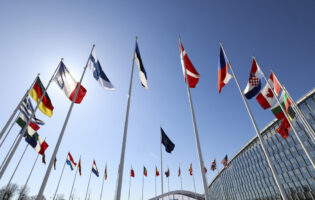The Zeitenwende: Germany’s Reluctant Revolution
Three days into the Russian invasion of Ukraine, Chancellor Olaf Scholz announced a revolution in German foreign and security policy. Under the title Zeitenwende (turning point), he initiated a set of far-reaching policy shifts. Germany’s partners welcomed these bold announcements. For a moment, it seemed as if Germany had woken up from its post-Cold War slumber. Four months later, the question is whether Germany has really woken up, and if so, for how long? What do the first four months of implementation tell us about the scope, pace, and durability of the Zeitenwende? What should Germany do next to overcome internal constraints, advance its national security interests, and meet the expectations of its allies and partners?
Event Summary
AGI has been following the Western response since the February 24 Russian invasion of Ukraine. Particularly, Germany’s reaction to the deteriorated security situation in Europe has been named a Zeitenwende. But what does this term represent? What has changed in Germany’s defense and security policy? How will it affect Germany’s military capabilities? How sustainable it will be? What will this mean not only for Germany but also for Europe and the transatlantic partnership?
Firstly, how did this reluctant revolution start?
- The supposed revolution was initiated by Chancellor Scholz with his ground-breaking speech in the Bundestag on February 27, whereby he defined Germany’s security response to Russia’s aggression as a Zeitenwende, a change of time, a watershed moment.
- The announced range of far-reaching measures included: a 100 billion euro special fund for the Bundeswehr and with that reaching the 2 percent yearly target of GDP spent on defense; the delivery of weapons to Ukraine against Germany’s foreign policy historic principle of not delivering weapons to conflict zones; the commitment to nuclear sharing within NATO and the replacement of the outdated Tornado Jets with the acquisition of the F-35s, ending long-lasting and controversial domestic debates; the halt of the certification of the gas pipeline Nord Stream 2 and the agreement to exclude a range of Russian banks from the SWIFT international payment system.
Altogether the speech and announcement can be called revolutionary as they mark two departures from the traditional German foreign and security policy:
- The principle of Wandel durch Handel (change through trade), which characterized Germany’s Ostpolitik (eastern policy) and the Russian policy.
- The principle of military restraint, which has been at the core of Germany’s strategic culture for many decades.
From the insights gathered from discussions with U.S. security and defense experts, two types of responses to the Zeitenwende generally emerged:
- Representatives of the current administration appreciated and welcomed Germany’s shifts, as Germany is finally doing what the United States has been advocating for a long time, namely reaching the 2 percent spending on defense and blocking Nord Stream 2.
- The broader policy community remained more skeptical; in the months following Chancellor Scholz’s speech, Germany still had to be dragged along on every step rather than taking the lead. Security experts wondered whether Germany indeed woke up and how sustainable and decisive this Zeitenwende really is. This skepticism originates from the Munich Consensus of 2014, after the first Russian aggression in Ukraine, when at the time the German foreign and defense ministers already announced a shift toward greater international responsibility, including the use of force as a last resort. However, this shift revealed itself to be less radical than expected.
The slow start of the Zeitenwende can be seen by:
- The contrast between the start of the Zeitenwende and the clear speech on February 27. As seen in the weapon deliveries issue, it took the government two months to decide whether heavy weapons and tanks would be included and another two months to actually start delivering these weapons. For instance, by mid-June, only one-third of the announced weapon value had been delivered to Ukraine.
- The debt-financed special fund for the military, which had to be inscribed in Germany’s constitutional law to circumvent the debt brake and hence required a two-thirds majority to be approved, provoked a controversial discussion both within the government coalition and the Christian Democrats, causing a delay in the vote.
The above-mentioned examples point toward four interlinked German domestic constraints:
- A communication problem, starting from the initial announcement in mid-February of the 5,000 helmet delivery to Ukraine to the recent criticism of the chancellor and his defensive public reactions. The government has given shifting excuses and explanations for the delays in the deliveries that were later dismissed by allies and security experts, ranging from the lack of ammunition to the claim of not depleting the Bundeswehr’s arsenal and the false claim for NATO’s approval before sending modern tanks to Ukraine. This caused Germany to receive criticism from Ukraine and Western partners.
- Shifting party politics were crucial to allow the Zeitenwende to happen, as the coalition parties had to change long-standing positions. Particularly for the Social Democrats, it was a difficult shift because the party had to change policies on military restraint and weapon deliveries to combat zones as well as revise its decades of Ostpolitik. The Green Party shifted surprisingly quickly from its traditional pacificist stance, but this was facilitated by a previous internal party debate that had already taken place with the Kosovo case in 2008. Lastly, the Liberals had to adjust their positions on the special fund for the military because they are against debt-financed instruments and eager to reinstate the debt brake soon. Overall, the governing parties’ support for the Zeitenwende was strong, but each is still in the process of internally discussing the programmatic implications of this announced revolution and reviewing the new understanding of the military.
- The public opinion affecting Germany’s traditional foreign policy. Despite a historical pacificist approach held by the German population, right after Russia’s invasion began, polls showed how the majority shifted suddenly to support more defense investments and weapon deliveries. However, on the delivery of heavy weapons, public opinion is more divided due to fears that this could result in further escalation. Chancellor Scholz has particularly considered the escalation concern and defined it as Germany’s red line. While this rhetoric resonated well with the German public, it drew criticism from Germany’s international partners. The most recent polls signal the first signs of war fatigue among the public, combined with inflation concerns and potential energy cuts, which all risk undermining the public support for the Zeitenwende.
- Institutional limits and lack of a strategic culture. Experts underline both the lack of security expertise within the chancellery and the absence of a proper national security council. These aspects can explain both the communication issues that emerged and the cumbersome German procurement procedures, which result in cost inefficiencies and delays.
These four constraints will determine the pace, scope, and durability of the Zeitenwende. While internationally, the expectations of Germany’s leadership and action will rise, there are a few policy recommendations to make the Zeitenwende durable:
- The first national security strategy document, which is expected to be published by early 2023, will define Germany’s common and future direction of the Zeitenwende, address Germany’s relations with Russia, and address further questions regarding crisis management and relations with China. This process will be inclusive, as the German foreign minister is doing public outreach during the summer and promoting security policy debates.
- Concerning the institutional structure, Germany should review and reform its security architecture by bolstering the security expertise within the chancellery through the creation of a national security advisor post and a national security council to coordinate between the different ministries.
- As Germany will have the responsibility to lead the European Zeitenwende, Germany should become a European pillar within NATO contributing to the increase of the readiness force to 300,000 troops and, as announced, upgrading its presence in Lithuania to a brigade size in 2023. Further, Germany should become the motor of EU security and defense policies by driving the implementation of the EU Strategic Compass and by consolidating the defense market within Europe and fostering joint procurement and projects.
In conclusion, despite a reluctant start of the Zeitenwende in contrast with its strong announcement, it is unlikely that Germany will repeat what happened after the Munich Consensus of 2014 because of broader political support, the announcement of more drastic policy actions, and a stronger public awareness of the threat posed by Russia. Therefore, it is fundamental that the political parties define a clear direction of the Zeitenwende, maintaining both the political and public support considering competing priorities.
Supported by the DAAD with funds from the Federal Foreign Office.






